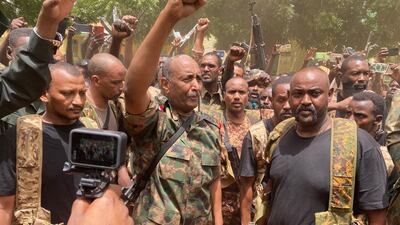Sudan's warring sides are extensively engaging in "manipulative activity" online, a disinformation monitoring group told The National, after it had scrolled through more than 30,000 tweets from accounts posting in favour of the Rapid Support Forces (RSF), the army (SAF) and former regime Islamists.
The approach is what differs between the three sides, said Amil Khan, director of Valant Project.
"The SAF favours using mass, spam posts to give the impression that it has high levels of popular support. The RSF seems to be mostly aiming at foreign audiences – regional and western. Its approach relies more heavily on a small number of high-value accounts, with some inauthentic amplification through mass retweets," he said.
In each case, the methodology and aim of the groups are connected, Mr Khan said.
"The SAF is seeking popular backing, the RSF is seeking external legitimacy and the Islamists want to claw back power. Each uses their online infrastructure to achieve those aims."
Additionally, hashtags in support of both sides have been used to further claims by the warring parties of breaches of several ceasefires brokered by the US and Saudi Arabia.
"Sudan has been targeted by people or organisations who want to destabilise the country. Despite some efforts by internet and social media companies, false information does get through – so it's important that journalists and society at large know the truth about what's happening," said Derek Ivens, a Thomson Foundation trainer.
Twitter has also recently monetised its blue tick, enabling users who have bought one to appear more prominently on the website. This option was previously available only for accounts that had verified themselves to Twitter, through a series of identity authenticating questions, either as an organisation or an individual, such as a public figure.
Before the new change in rules, paramilitary accounts belonging to the RSF and the Houthi rebel militia, for example, would not have been given a blue tick.
On May 12, the RSF falsely claimed it had taken control of the capital Khartoum, nearly a month after the war between it and the army broke out.
However, clashes continue after several ceasefires and attempts by the US, UN and Saudi Arabia to end the fighting.
Ten days after the fighting broke out on April 15, a video purportedly showing civilians throwing stones at vehicles belonging to the RSF began recirculating on Twitter. The video actually dates from 2019, when a deadly crackdown on anti-government protests was taking place.
Internet empowerment NGO Smex says this kind of disinformation is "particularly dangerous" and "might encourage civilians to take it upon themselves to face paramilitary forces on the ground, leading to fatal repercussions".


